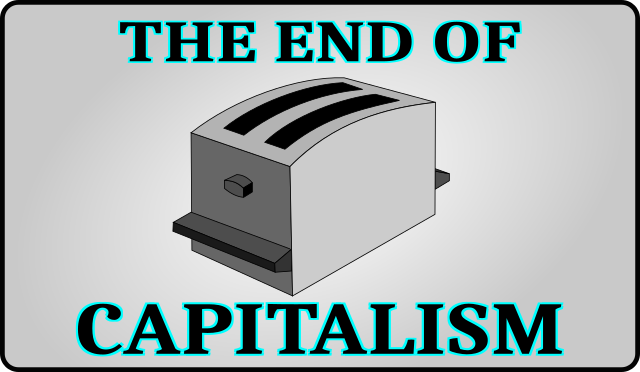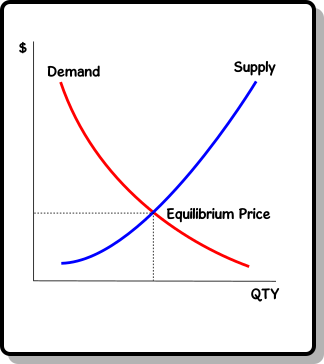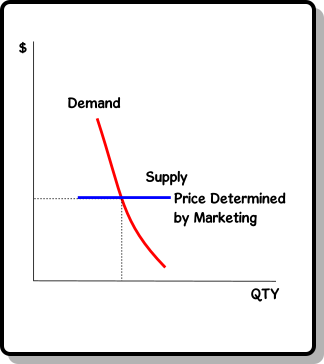
We truly are at the beginning of the end of capitalism.
But, we could say the end of capitalism was back in 1971 when Nixon took us off the gold standard.
To understand this, we really need to define capitalism. And not the new version of capitalism.
Capitalism: The gathering of capital to embark upon an endeavor.
Of course this requires a framework of private ownership rights.
It is also usually associate with a free market, where people are free to trade or not trade. Where there is competition in supply and demand.
Today we have an all out, drag out fight between "capitalism" and "communism", neither of which exists.

What really is Capitalism?
One cannot have capitalism when there is a group of people who can create money whenever they want and set the price for that money to whatever they want. (This is also true for communism, but Marx wrote differently)
Back in the early 1900s business school was about how to accumulate capital.
If you wanted to build a factory, you would need to accumulate capital.
You would need to go to people with money, or rearrange an existing business to free up capital.
Today, you get money from the banking system. Which makes it out of thin air and lends it at unheard of low interest rates. (yes, today's seemingly high interest rate, compared to zero of last year, is extremely low) A person lending out their money wouldn't ever do so for such low rates, they couldn't even cover their costs of servicing the loan for these rates.
The way modern banks are able to do this, is that they create the money out of thin air. So, they aren't really putting up their money. So, they have a lot more room to work with costs of handling a loan.
Since fractional reserve banks can make money our of thin air, the idea of accumulating capital is no longer a thing. And this is why capitalism is dead.

The other half of capitalism... or what is usually linked with capitalsim - free-market capitalism

The free market is supposed to set the price. Finding a balance between supply and demand.
The higher the price, the more supply will be made available... but also the less people who will pay for it at that price.
The lower the price, the more people will buy... but the less suppliers who will want to supply this.
Or that is how the economics class says it is supposed to be...

However, economies of scale added to banksters being able to create money, has led to something far different.
Once a factory is set up to make a good, many things happen.
- There is now a minimum number of parts that can be made. If a certain minimum amount of income is not met, the factory shuts down.
- There is a maximum number of parts that can be made. Running things 24 hours a day is all you can do.
- The price gets set by marketing and not by actual production costs.
With economies of scale, there comes a barrier of anyone who would dare to compete.
The existing factory can out compete any new comers in the field of commodity items.
And there isn't a bunch of people waiting to buy if only the price were lower.
So, there isn't much incentive to compete.

The end of capitalism
... and maybe the beginning of true communism????
Today we have robotics, CNC machining and 3D printing.
And as these technologies increase, anyone can be a manufacturer.
Along with the internet and blockchain connecting people, it will soon be possible for people to manufacture all their community's needs. Thus, for the first time, despite Marx, the workers can own the means of production.
Another thing coming to the forefront of society is the need to build better, longer lasting, fixable things. With local manufacturing through a computer, it is quite easy to just create the part again, to replace what has worn out or broken.
The capital outlay for the CNC machine is actually quite small (compared to a manufacturing plant), and this is where capitalism ends. When your average middle class person can save up enough money to get a machine and start manufacturing, then there really isn't much barrier to entry.
And this is what will make free-markets actually work. Many suppliers and many consumers. So, there is actually a real competition to discover a real price.
Paradoxically, this is also what Marx discussed. The worker owning the means of production. (but, without the state being involved.)

Ummm... don't think it will come like you say - maybe.
Downvoting a post can decrease pending rewards and make it less visible. Common reasons:
Submit
Nope, probably not.
But no innovation comes nice and neatly.
Downvoting a post can decrease pending rewards and make it less visible. Common reasons:
Submit
So you Marxism is an improvement?
Downvoting a post can decrease pending rewards and make it less visible. Common reasons:
Submit
Marxism is not an improvement, especially the way he defined govern-cement being in control.
But, i believe labor owning the means of production as a good thing. Basically, it is a bunch of small businesses.
Big corporations can go stop existing.
Downvoting a post can decrease pending rewards and make it less visible. Common reasons:
Submit
Good for a minute I wasn't exactly certain of what you endorsed.
Small business is good.
I had a hell of a night. About a week ago, I nailed Azazael, a high order demon. They are falling like swatted flies.
I lost my guardian angel tonight. Pat, passed in the exchange. He'll be back in a couple of months.
Meanwhile, I nailed another one tonight. Oh was so exciting. Nothing like excitement. Don't know its name.
Sent by China.
However I was rewarded with 5 million points. That puts me at 33,638,584 points.
Oh yeah: Satan is bound. Lucifer and Belial are dead. There's tonight's two funny bunnies and whole shitloads of their pals. Of course I hurt like hell but...I feel good - like song of the same name.
Downvoting a post can decrease pending rewards and make it less visible. Common reasons:
Submit
@tipu curate
Downvoting a post can decrease pending rewards and make it less visible. Common reasons:
Submit
Upvoted 👌 (Mana: 5/8) Get profit votes with @tipU :)
Downvoting a post can decrease pending rewards and make it less visible. Common reasons:
Submit
Thank y ou
Downvoting a post can decrease pending rewards and make it less visible. Common reasons:
Submit